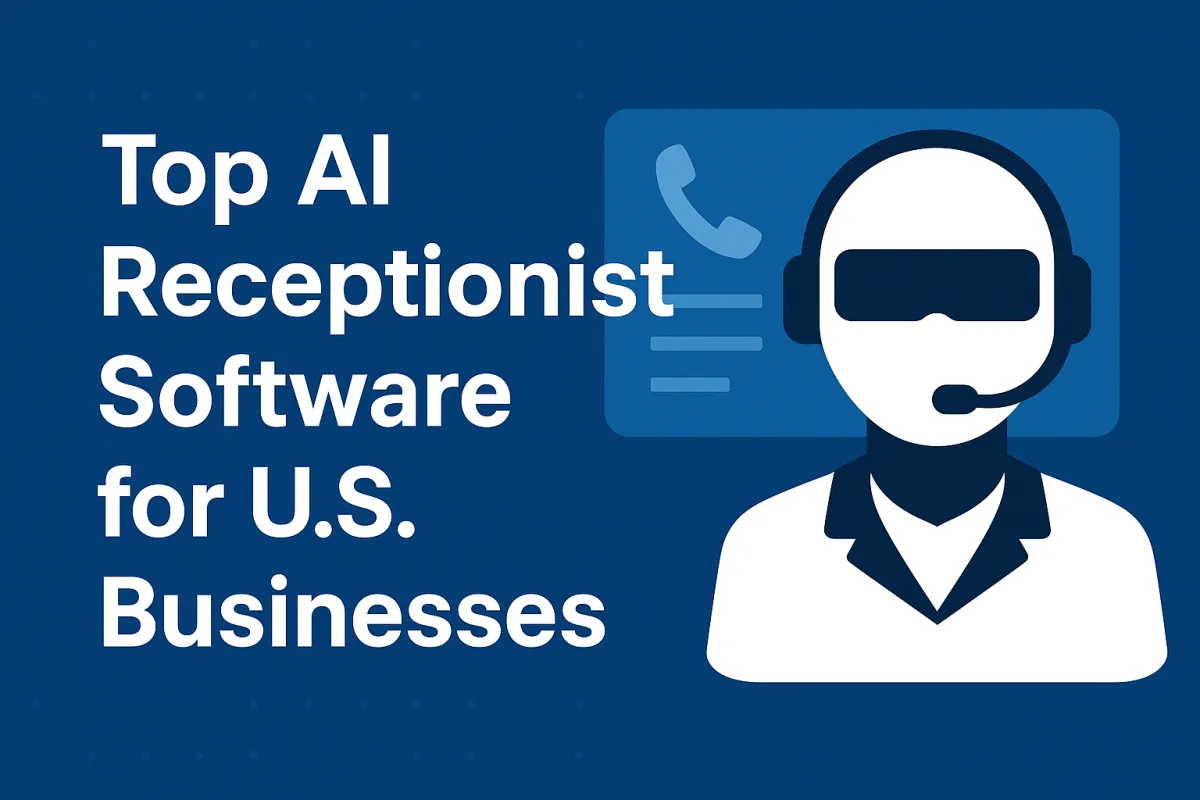
Top AI Receptionist Software for U.S. Businesses (And What They Cost)
If you're running a business in the U.S., managing calls, customer enquiries, appointment bookings, and messages can take up a lot of time. An AI receptionist or virtual receptionist service helps automate much of that front-desk load — freeing you to focus on growth, not on answering every inbound ring. Here’s a guide to some of the best U.S. options as of 2025: what they cost, what they can do, their pros & cons, and which types of companies they suit best.
Why Use an AI Receptionist in the U.S.?
Reduced overhead vs hiring full-time human receptionists (training, salaries, turnover).
24/7 availability so you never lose leads after hours.
Seamless integrations with CRMs, calendars, messaging / VoIP systems.
Scalable: handle many simultaneous calls or messages.
Best U.S. AI / Virtual Receptionist Services
Here are six leading vendors, including their pricing, features, strengths, and trade-offs.
1. Smith.ai
What it does: AI-first answering, human-backup, lead screening, appointment scheduling, call routing, integrations with CRMs, call summaries.
Pricing: Plans begin at approx US$95/month for their AI receptionist package.
Pros:
Hybrid model (AI + human) helps with complex inquiries.
Strong CRM / calendar integrations.
Local US phone numbers available.
Cons:
More expensive if you need large volumes or human-agent involvement.
No built-in email marketing suite — you’ll likely need separate tools.
2. Jobber (with AI Receptionist Add-on)
What it does: Platform focused on field/service businesses (maintenance, home services, landscaping etc.). Handles calls/messages/booking; includes client hubs, scheduling, invoicing etc.
Pricing: AI Receptionist add-on is approx US$99/month; Jobber’s Plus tier (with more features) is significantly more.
Pros:
Ideal if you already use Jobber for scheduling/client management.
Built-in CRM / client management.
Cons:
Mostly useful for businesses with “on-site” or field operations.
Less suited for very high call volume or businesses outside service industries.
3. Abby Connect (Hybrid Live + AI)
What it does: Live receptionist service + optional AI layer to handle routine tasks, FAQs, and basic call routing.
Pricing: Starting around US$99/month for lower volumes.
Pros:
Human touch for sensitive calls or when nuance matters.
Good reputation and strong support.
Cons:
Cost escalates with volume of calls or minutes.
AI capabilities may be less advanced than “all-AI” providers in terms of automation & integrations.
4. Synthflow AI
What it does: AI answering, appointment scheduling, FAQ automation, lead capture forms, workflows.
Pricing: Around US$99/month for entry plans, increasing with call/minute capacity and features.
Pros:
Strong emphasis on automation and workflow integrations.
Good for businesses wanting structured routines & data capture.
Cons:
Setup/training may be needed to get scripts and flows working smoothly.
May require combining with other tools (e.g. email marketing) to cover all your client engagement.
5. HighLevel (AI Employee / Voice AI)
What it does: HighLevel’s “AI Employee” suite offers a powerful all-in-one approach. It includes Voice AI (phone answering, missed-call capture, qualification, appointment booking), Conversation AI (SMS, social media chatbots), Reviews AI (manage/respond to reviews automatically), Funnel AI (build landing pages / funnels), Workflow AI Assistant, Content AI (generate copy/images), etc.
Pricing:
Flat rate: US$97/month per sub-account for “AI Employee” unlimited access to all AI components.
Voice AI usage: approx $0.13/minute if not using unlimited plan; phone line infrastructure (LC Phone) has separate wallet charges for inbound/outbound minutes, local/toll-free numbers.
Pros:
Very feature-rich. It’s not just a receptionist: you get marketing automation, funnels, content, workflows, chat & SMS, reviews all in one place.
Unlimited AI plan helps reduce complexity of managing multiple tools.
Good for scalability: more features as your business grows.
Cons:
More complex setup and learning curve because there are many tools built in.
Additional costs for telecom infrastructure (phone lines, minutes, etc.) may add up.
If your usage (calls, SMS, etc.) is very light, you may be overpaying relative to simpler solutions.
What to Compare When Choosing

Which Option Fits Which Business Type?
Small businesses with low call volume → simpler / lower-cost tools (Synthflow, basic Smith.ai, maybe Voice AI only via HighLevel).
Service-industry / field service businesses → Jobber, HighLevel (if you want more automation), those with strong scheduling & mobile / in-field features.
High-growth / marketing agencies → platforms with advanced workflow, content, funnels & marketing automation (HighLevel stands out).
Businesses needing human support (legal, health, high-stakes customer calls) → hybrid solutions with live agents + AI backup.
Final Thoughts & Call to Action
An AI receptionist can not only save you staff time and costs — it ensures you never miss a lead, improves customer response, and lets your business scale smoother. The right choice depends on your call volume, how much automation vs human touch you want, and whether you need marketing / funnel / content tools integrated too.
Want to see how this works in practice? Sign up for our next AI Employee Workshop or watch our most recent session here.
